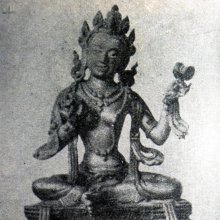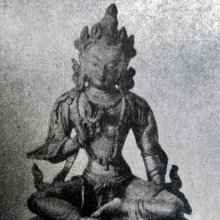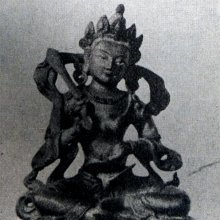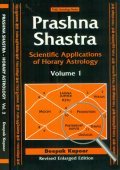Karka, Kaṟkā: 21 definitions
Introduction:
Karka means something in Hinduism, Sanskrit, Jainism, Prakrit, the history of ancient India, Marathi, Hindi, biology, Tamil. If you want to know the exact meaning, history, etymology or English translation of this term then check out the descriptions on this page. Add your comment or reference to a book if you want to contribute to this summary article.
Images (photo gallery)
In Hinduism
Purana and Itihasa (epic history)
Source: Cologne Digital Sanskrit Dictionaries: The Purana IndexKarka (कर्क).—A ṛtvik at the sacrifice of Brahmā.*
- * Vāyu-purāṇa 106. 37.

The Purana (पुराण, purāṇas) refers to Sanskrit literature preserving ancient India’s vast cultural history, including historical legends, religious ceremonies, various arts and sciences. The eighteen mahapuranas total over 400,000 shlokas (metrical couplets) and date to at least several centuries BCE.
Jyotisha (astronomy and astrology)
Source: Wisdom Library: Brihat Samhita by VarahamihiraKarka (कर्क) or Karkaṭa refers to the sign of Cancer, according to the Bṛhatsaṃhitā (chapter 5), an encyclopedic Sanskrit work written by Varāhamihira mainly focusing on the science of ancient Indian astronomy astronomy (Jyotiṣa).—Accordingly, “If the sun and moon should begin to be eclipsed when only half risen, deceitful men will suffer as well as sacrificial rites. [...] If they should be eclipsed when in the sign of Gemini (Mithuna), chaste women, princes, powerful petty chiefs, learned men, people living on the banks of the Yamunā and the rulers of Bahlikā and Matsya with their subjects will suffer miseries. If they should be eclipsed when in the sign of Cancer (Karka) [i.e., karkaṭa] the Ābhīras, the Śabaras, the Pallavas, the Mallas, the Matsyas, the Kurus, the Śakas, the Pāñcālas and the Vikalās will be afflicted with miseries and food grains will be destroyed”.

Jyotisha (ज्योतिष, jyotiṣa or jyotish) refers to ‘astronomy’ or “Vedic astrology” and represents the fifth of the six Vedangas (additional sciences to be studied along with the Vedas). Jyotisha concerns itself with the study and prediction of the movements of celestial bodies, in order to calculate the auspicious time for rituals and ceremonies.
In Jainism
Jain philosophy
Source: archive.org: Anekanta Jaya Pataka of Haribhadra SuriKarka (कर्क) refers to a kind of horse, as occurring in the Anekāntajayapatākā-prakaraṇa, a Śvetāmbara Jain philosophical work written by Haribhadra Sūri.—[Cf. Vol. I, P. 20, l. 8]—On this very page, l. 23, the commentator explains ‘karka’ as a kind of horse. Does he mean ‘a white horse’, the meaning to be found in various dictionaries? The word ‘karka’ occurs on p. 120a ll. 7 & 22. [...] Kalki or Kalkin who is looked upon as the tenth and the last incarnation of Viṣṇu, is said to have a white horse to ride upon. So Muni Kalyāṇavijaya in his “vīranirvāṇasaṃvat” (p. 48) has suggested that the word ‘kalki’ may be a Sanskritized form of kakkī, kakka the Pāiya (Prākṛta) word meaning a white horse.
-
General definition (in Jainism)
Source: HereNow4U: Period Of Rule Of Kadamba DynastyIn 972AD, the 20th ruler of Rāṣṭrakūṭa dynasty, Karka (or Amogha Varṣa-II) was defeated by King Harṣa Siyāla of Dhārā. With this defeat and loss of their capital Mānyakheṭa, the Rāṣṭrakūṭa dynasty, which was the profound propagator and protector of Jainism, became almost extinct.

Jainism is an Indian religion of Dharma whose doctrine revolves around harmlessness (ahimsa) towards every living being. The two major branches (Digambara and Svetambara) of Jainism stimulate self-control (or, shramana, ‘self-reliance’) and spiritual development through a path of peace for the soul to progess to the ultimate goal.
India history and geography
Source: What is India: Epigraphia Indica volume 4 (1896-97)Karka I or Karkarāja I, son of Govinda I, is the name of an ancient king from the Rāṣṭrakūṭa dynasty, as mentioned in the “Kaḍaba plates of Prabhūtavarṣa” (9th century A.D.). These copper-plates (mentioning Karka) were found at Kaḍaba, situated in the Tumkūr district of the Mysore State. It records that the king Prabhūtavarṣa, (i.e. Govinda III.) presented the village of Jālamaṅgala to the Jaina muni Arkakīrti, on behalf of the temple of Jinendra at Śilāgrāma. It is dated to the 24th May A.D. 812.

The history of India traces the identification of countries, villages, towns and other regions of India, as well as mythology, zoology, royal dynasties, rulers, tribes, local festivities and traditions and regional languages. Ancient India enjoyed religious freedom and encourages the path of Dharma, a concept common to Buddhism, Hinduism, and Jainism.
Biology (plants and animals)
Source: Google Books: CRC World Dictionary (Regional names)1) Karka in India is the name of a plant defined with Terminalia chebula in various botanical sources. This page contains potential references in Ayurveda, modern medicine, and other folk traditions or local practices It has the synonym Myrobalanus chebula (Retz.) Gaertn. (among others).
2) Karka in Pakistan is also identified with Fagonia indica It has the synonym Fagonia parviflora Boiss. (etc.).
Example references for further research on medicinal uses or toxicity (see latin names for full list):
· FBI (1878)
· Plant Systematics and Evolution (1996)
· Systema Naturae, ed. 12 (1767)
· Diagn. Pl. Orient. (1849)
· Journal of Cytology and Genetics (1990)
· Prodr. (DC.) (1824)
If you are looking for specific details regarding Karka, for example pregnancy safety, side effects, extract dosage, health benefits, chemical composition, diet and recipes, have a look at these references.

This sections includes definitions from the five kingdoms of living things: Animals, Plants, Fungi, Protists and Monera. It will include both the official binomial nomenclature (scientific names usually in Latin) as well as regional spellings and variants.
Languages of India and abroad
Marathi-English dictionary
Source: DDSA: The Molesworth Marathi and English Dictionarykarka (कर्क).—m (S) A crab. 2 The sign Cancer.
Source: DDSA: The Aryabhusan school dictionary, Marathi-Englishkarka (कर्क).—m A crab. The sign Cancer. karkavṛttaṃ- rēkhā n Tropic of Cancer.
Marathi is an Indo-European language having over 70 million native speakers people in (predominantly) Maharashtra India. Marathi, like many other Indo-Aryan languages, evolved from early forms of Prakrit, which itself is a subset of Sanskrit, one of the most ancient languages of the world.
Sanskrit dictionary
Source: DDSA: The practical Sanskrit-English dictionaryKarka (कर्क).—a. [kṛ-ka Uṇādi-sūtra 3.4]
1) White; गौः श्वेत इति भवति, अश्वः कर्क इति (gauḥ śveta iti bhavati, aśvaḥ karka iti) Mahābhārata on P.I.2.71. कर्कीं वत्सामिह रक्ष वाजिन् (karkīṃ vatsāmiha rakṣa vājin) Av.4.38.6.
2) Good, excellent.
-rkaḥ 1 A crab.
2) Cancer, the fourth sign of the zodiac.
3) Fire.
4) A water-jar.
5) A mirror.
6) A white horse. Mahābhārata (Bombay) 7.132.3.
7) A kind of gem.
8) A vessel made out of a cocoanut shell.
9) A niggard. cf. ... कर्कस्तु मल्लके । घटभेदाग्निमुकुरसिताश्वकृपणेष्वपि (karkastu mallake | ghaṭabhedāgnimukurasitāśvakṛpaṇeṣvapi) | Nm.
-rkā A white mare; Kathāsaritsāgara 121.278. [cf. Pers. kark; L. cancer; Gr. korkinos].
Source: Cologne Digital Sanskrit Dictionaries: Shabda-Sagara Sanskrit-English DictionaryKarka (कर्क).—mfn.
(-rkaḥ-rkā-rkaṃ) 1. White. 2. Good, excellent. m.
(-rkaḥ) 1. A white horse. 2. A mirror. 3. A water jar. 4. A crab. 5. A sign of the zodiac, (Cancer.) 6. A fire. 7. A long gourd. 8. Beauty. E. kṛ to do, &c. ka Unadi aff.
Source: Cologne Digital Sanskrit Dictionaries: Benfey Sanskrit-English DictionaryKarka (कर्क).—m. A white horse, Mahābhārata 13, 4921.
Source: Cologne Digital Sanskrit Dictionaries: Cappeller Sanskrit-English DictionaryKarka (कर्क).—[feminine] ī white; [masculine] a white horse ([feminine] ā).
Source: Cologne Digital Sanskrit Dictionaries: Aufrecht Catalogus Catalogorum1) Karka (कर्क) as mentioned in Aufrecht’s Catalogus Catalogorum:—Āpastambagṛhyavivaraṇa. Iṣṭakāpūraṇabhāṣya. Kaṇvasūtrabhāṣya. Kātyāyanaśrautasūtrabhāṣya. Trikāṇḍamaṇḍanabhāṣya. K. 178. Pāraskaragṛhyasūtravivaraṇa. Śulbasūtravivaraṇa Kāty. Śrāddhakalpabhāṣya Kāty. Snānasūtravivaraṇa Kāty. Hautrakapariśiṣṭabhāṣya Kāty.
2) Karka (कर्क):—Laghukārikā.
3) Karka (कर्क):—Āpastambagṛhyavivaraṇa. Iṣṭakāpūraṇabhāṣya. Kaṇvasūtrabhāṣya. Kātyāyanaśrautasūtrabhāṣya. Trikāṇḍamaṇḍanabhāṣya. K. 178. Pāraskaragṛhyasūtravivaraṇa. Śulbasūtravivaraṇa Kāty. Śrāddhakalpabhāṣya Kāty. Snānasūtravivaraṇa Kāty. Hautrakapariśiṣṭabhāṣya Kāty.
Source: Cologne Digital Sanskrit Dictionaries: Monier-Williams Sanskrit-English Dictionary1) Karka (कर्क):—mf(ī)n. (√kṛ, [Uṇādi-sūtra iii, 40]; cf. karaṅka), white, [Atharva-veda iv, 38, 6; 7]
2) good, excellent, [Horace H. Wilson]
3) m. a white horse, [Mahābhārata]
4) a crab, [cf. Lexicographers, esp. such as amarasiṃha, halāyudha, hemacandra, etc.]
5) the sign Cancer
6) a water-jar, [cf. Lexicographers, esp. such as amarasiṃha, halāyudha, hemacandra, etc.]
7) fire, [cf. Lexicographers, esp. such as amarasiṃha, halāyudha, hemacandra, etc.]
8) a mirror, [cf. Lexicographers, esp. such as amarasiṃha, halāyudha, hemacandra, etc.]
9) a younger brother of the father, [cf. Lexicographers, esp. such as amarasiṃha, halāyudha, hemacandra, etc.]
10) beauty, [cf. Lexicographers, esp. such as amarasiṃha, halāyudha, hemacandra, etc.]
11) a particular gem, [cf. Lexicographers, esp. such as amarasiṃha, halāyudha, hemacandra, etc.]
12) Name of a plant (= karkaṭa), [cf. Lexicographers, esp. such as amarasiṃha, halāyudha, hemacandra, etc.]
13) Name of a commentator
14) Karkā (कर्का):—[from karka] f. a white mare, [Kathāsaritsāgara cxxi, 278.]
Source: Cologne Digital Sanskrit Dictionaries: Yates Sanskrit-English DictionaryKarka (कर्क):—(rkaḥ) 1. m. A white horse; a mirror; a water-jar; a crab; fire; a long gourd; beauty. a. White. good, excellent.
Source: DDSA: Paia-sadda-mahannavo; a comprehensive Prakrit Hindi dictionary (S)Karka (कर्क) in the Sanskrit language is related to the Prakrit word: Kakka.
[Sanskrit to German]
Sanskrit, also spelled संस्कृतम् (saṃskṛtam), is an ancient language of India commonly seen as the grandmother of the Indo-European language family (even English!). Closely allied with Prakrit and Pali, Sanskrit is more exhaustive in both grammar and terms and has the most extensive collection of literature in the world, greatly surpassing its sister-languages Greek and Latin.
Hindi dictionary
Source: DDSA: A practical Hindi-English dictionaryKarka (कर्क) [Also spelled kark]:—(nm); —[rāśi] cancer—the sign of zodiac; —[rekhā] tropic of cancer.
...
Kannada-English dictionary
Source: Alar: Kannada-English corpusKarka (ಕರ್ಕ):—[noun] matter that settles to the bottom of a liquid; sediment; dregs.
--- OR ---
Karka (ಕರ್ಕ):—
1) [adjective] having the colour of pure snow or milk; white.
2) [adjective] morally or spiritually pure; spotless; innocent.
--- OR ---
Karka (ಕರ್ಕ):—
1) [noun] any of numerous ten-footed crustaceans having the first pair of legs modified as pincers; crab.
2) [noun] a white horse.
3) [noun] the state or process of combustion, in which substances using the oxygen available in the air, giving out bright light and heat; the substance so burning; fire.
4) [noun] a water jar.
5) [noun] an image-giving metal piece with a smooth surface or glass coated on the otherside as not to allow the light to pass through; a mirror.
6) [noun] the fourth sign of the zodiac, entered by the sun about June 21; the Cancer.
7) [noun] 'a malignant new growth anywhere in the body of a person or animal; malignant tumor: cancer.'
Kannada is a Dravidian language (as opposed to the Indo-European language family) mainly spoken in the southwestern region of India.
Tamil dictionary
Source: DDSA: University of Madras: Tamil LexiconKaṟkā (கற்கா) [kaṟ-kā] noun < கல் [kal] + கா³. [ka³.] See கற்காநாடு. [karkanadu.] (நன். [nan.] 272, மயிலை. [mayilai.])
Tamil is an ancient language of India from the Dravidian family spoken by roughly 250 million people mainly in southern India and Sri Lanka.
See also (Relevant definitions)
Starts with (+192): Kar-kantupanakam, Kar-kattavelalar, Kar-kattiitaiyar, Kar-kattumotiram, Karkaataka-shringi, Karkabhashya, Karkaca, Karkacam, Karkacandeshvaritantra, Karkacandreshvaratantra, Karkacha, Karkachirbhati, Karkachirbhiti, Karkacirbhati, Karkacirbhita, Karkacirbhiti, Karkada, Karkadavamdi, Karkade, Karkadu.
Ends with: Karmavipakarka, Shitakarka.
Full-text (+141): Karkasara, Karkika, Karkandhu, Kakka, Karkaphala, Karkakhanda, Karkacirbhiti, Vamshantara, Karkatu, Dirghavamsha, Kukshirandhra, Brihannada, Kicaka, Karki, Karkaru, Karkanatu, Mahakarkarava, Hulugilahullu, Karkara, Karkasvamin.
Relevant text
Search found 25 books and stories containing Karka, Kaṟ-kā, Kar-ka, Karkā, Kaṟkā, Karkaa; (plurals include: Karkas, kās, kas, Karkās, Kaṟkās, Karkaas). You can also click to the full overview containing English textual excerpts. Below are direct links for the most relevant articles:
The Agnistoma Somayaga in the Shukla Yajurveda (by Madan Haloi)
Part 3.1: Construction of the Mahāvedī < [Chapter 4 - The Agniṣṭoma Ritual]
Part 4: Kātyāyana Śrautasūtra (Introduction) < [Chapter 1 - Introduction]
Part 3: The Adhikārins < [Chapter 2 - An Introduction to the Ritualistic Religion of the Vedas]
Rig Veda (translation and commentary) (by H. H. Wilson)
Rig Veda 10.102.6 < [Sukta 102]
Impact of Vedic Culture on Society (by Kaushik Acharya)
5. Religious Sacrifices < [Chapter 2]
Sanskrit Inscriptions (J): The Rāṣṭrakūṭas < [Chapter 3]
Mingling of Cultures (L): The Rāṣṭrakūṭas < [Chapter 4]
The Indian Buddhist Iconography (by Benoytosh Bhattachacharyya)
Ramayana of Valmiki (by Hari Prasad Shastri)
Chapter 18 - King Dasaratha’s sons are born and grow to manhood < [Book 1 - Bala-kanda]
Brihat Samhita (by N. Chidambaram Iyer)
Related products



